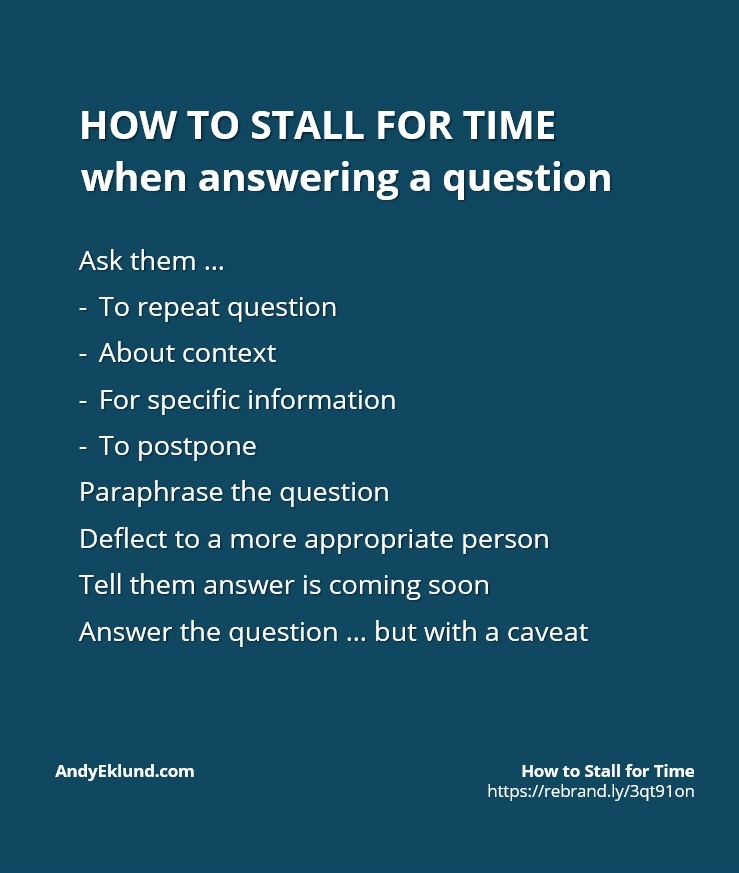It’s one of the most common situations in business. You’re focused on a specific task in front of you, intent to finish on time, and someone comes along to ask you a question. What’s the best way to stall for time so you can think, consider the question, or perhaps give a moment to compose yourself before actually answering the question.
Here are my best tips to stall for time when answering someone’s question.
Before I do (oops, am I stalling?), three important thoughts.
1. The list below is not interchangable. You always need to put yourself, the question and the other person into context.
2. Be genuine – but at the same time, do not lie, bluff or exaggerate.
3. Don’t automatically assume the worst.
They’re trying to trip you up.
They’re too lazy to find the answer themselves.
They’re testing you.
At least to start, consider their question a complement. They don’t know the answer and they think you’re the best person to give advice. The first impression will be you’re being helpful, and that’s never a bad thing.
Enough stalling! Here are my best tips:
1. Ask them to repeat the question.
This works best when you look like you were busy doing something else. Not so much when you were obviously looking directly at the person when they originally asked the question.
Sorry, I was just doing (XX). Can you repeat your question?
2. Ask questions about context.
Remember: information, without context, is useless.
Before I answer your question, I have a few questions about your question. Is that OK?
or …
That’s an interesting question. Before I answer, can I ask why you’re asking? Context helps me give you a better answer.
A note about ‘interesting question.’ Many people now consider interesting question an insult, or you’re just placating them by trying to use complementary words when you’re not being complementary at all.
You can avoid any mis-communication if you only use it when the question is truly interesting.
3. Ask for specific information, such as:
- An example or recent incident
- A specific situation that may have happened to them or someone else, such as a customer, employee, etc.
- Their opinion or initial point-of-view
- Someone’s testimonial (Well, Susan said that …)
- For clarification (they used a word, a phrase or jargon you don’t understand)
This is the first time I’ve heard about this. What brought this on? Did something happen?
4. Paraphrase the question … but who should paraphrase?
You? Yes, but always end with: “… and correct me if I’m wrong.”
Them? Yes, but only if you do not understand the question. Start with “Sorry, I honestly don’t understand the question. Can you rephrase it?”
5. Deflect to a better person to answer the question.
This option isn’t ‘technically’ a stall as you aren’t the person who should be answering the question. However, it’s not uncommon for a person to raise the question with you when the other, better person isn’t availabe, or they genuinely don’t know who to ask in the first place.
If you can answer the question as well as the ‘better person,’ then go ahead and answer.
If you cannot answer the question as well as the better person, divert – if not use it as an opportunity to network two people together.
That’s a great question, but Susan is the best person to answer it. Do you know her or can I introduce the two of you?
I’m not the best person to answer the question, but happy to try. Susan would have the most current answer for you. She should be back from lunch in about 30 minutes. Can I have her ring you?
6. Ask if it’s possible to postpone, but always tell them when you’ll come back to them.
If you don’t, you may look like you’re avoiding the question.
I’m on my way to a meeting. Can I come back to you later today? What time is good for you?
Note: Asking to use the restroom/WC is the only globally acceptable excuse that works every time to delay unless of course you just used it 10 minutes ago.
7. Tell them the answer is coming up very soon, such as in a PowerPoint presentation.
Some audience members are so too excited to ask their question during a formal presentation, and raise it before you’re ready to answer it. If the answer is coming up, say so.
8. Finally, if they demand an answer now, and stalling does not work, here’s the best answer:
Ok, I’d like to think about my answer, but if you need a response now, let me start with a caveat. I reserve the right to change my answer if I learn new information.
If it’s helpful, here’s a related post on What Makes a Good Question Good. Here too is a post in a similar vein: How to Stall When Being Interviewed.
How else have you stalled for time when answering an urgent question? Any other suggestions or responses you might suggest? Please add your thoughts and comments below.



No comment yet, add your voice below!